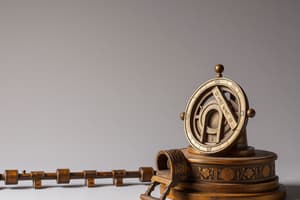Podcast
Questions and Answers
How did the discovery of precession influence Western astrology?
How did the discovery of precession influence Western astrology?
- It changed the focus to lunar phases instead of solar signs.
- It eliminated the need for astrological charts.
- It correlated Sun signs with seasonal changes. (correct)
- It made star constellations irrelevant.
What were ancient Babylonians primarily using astrology for?
What were ancient Babylonians primarily using astrology for?
- To predict eclipses and celestial events (correct)
- To predict financial markets
- To develop advanced navigation techniques
- To forecast weather patterns
What role did astrology play in the medical practices of the 17th century?
What role did astrology play in the medical practices of the 17th century?
- It was solely used for predicting illness without empirical evidence.
- It was combined with herbal remedies for effective treatment.
- It was used as a diagnostic tool along with astrological charts. (correct)
- It was entirely discredited and no longer utilized.
Why do contemporary astrology apps remain popular among users?
Why do contemporary astrology apps remain popular among users?
What did Dr. Russell Foster suggest about astrology's influence on human biology?
What did Dr. Russell Foster suggest about astrology's influence on human biology?
Which of the following reflects astrology's role in personal growth?
Which of the following reflects astrology's role in personal growth?
What did the scientific revolution challenge regarding astrology?
What did the scientific revolution challenge regarding astrology?
In modern medicine, how does astrology's approach to health align with current practices?
In modern medicine, how does astrology's approach to health align with current practices?
In what ways does astrology remain culturally and socially significant despite its lack of scientific basis?
In what ways does astrology remain culturally and socially significant despite its lack of scientific basis?
How does individualized medicine in modern practice relate to astrological medicine?
How does individualized medicine in modern practice relate to astrological medicine?
What is a key benefit of meticulous record-keeping in medicine?
What is a key benefit of meticulous record-keeping in medicine?
What role does astrology play in personal exploration?
What role does astrology play in personal exploration?
Why is astrology considered useful even if it is not a precise science?
Why is astrology considered useful even if it is not a precise science?
What key astronomical advancement did the Babylonians use to predict celestial events?
What key astronomical advancement did the Babylonians use to predict celestial events?
What was one major consequence of the scientific revolution for astrology?
What was one major consequence of the scientific revolution for astrology?
How does modern technology contribute to the revival of astrology?
How does modern technology contribute to the revival of astrology?
What belief about celestial phenomena did ancient Babylonians hold regarding their kings?
What belief about celestial phenomena did ancient Babylonians hold regarding their kings?
What aspect of human biology has been proposed as a connection to astrology?
What aspect of human biology has been proposed as a connection to astrology?
What relationship did 17th-century doctors find between astrology and medical practices?
What relationship did 17th-century doctors find between astrology and medical practices?
Why did astrologers resist scientific discoveries during the decline of astrology?
Why did astrologers resist scientific discoveries during the decline of astrology?
What percentage of Americans currently believe in astrology's scientific basis?
What percentage of Americans currently believe in astrology's scientific basis?
Flashcards are hidden until you start studying
Study Notes
Astrology and Science
- Astrology has its origins in ancient Babylon, where people observed stars and their patterns, connecting them to daily life events.
- Ancient Babylonians used astrology to predict eclipses and other celestial events, believing they were omens.
- Astrologers in ancient Greece and India discovered the Earth's precession, a slow movement of the Earth's axis, requiring precise astronomical observations.
- The discovery of precession led to the development of Western astrology, where Sun signs are correlated with the seasons rather than specific star constellations.
- The scientific revolution challenged astrology's core principles, as the heliocentric model of the solar system replaced the Earth-centered view.
- The scientific community ridiculed astrology in the 17th century, with figures like Isaac Newton discrediting it through scientific advancements.
Astrology's Modern Relevance
- Astrology remains popular, with a significant portion of Americans believing it has some scientific validity.
- Contemporary astrology apps, like Co-Star, leverage algorithms and personalized predictions based on astrological interpretations.
- The popularity of astrology apps stems from their ability to provide a framework for understanding emotions, relationships, and personal struggles.
- While not scientifically validated, astrology serves as a powerful social tool for self-exploration and connection.
Scientific Perspectives on Astrology
- Dr. Russell Foster, a circadian neuroscientist, argues that astrology's core concept of seasonal influence on human biology is supported by scientific evidence.
- Scientific studies show correlations between birth season and various health outcomes, including schizophrenia, seasonal affective disorder, and lifespan.
- Astrology has historically served as a medical tool, with 17th-century doctors utilizing astrological charts for diagnosis and prognosis.
- Modern medicine is moving towards personalized medicine, taking a holistic approach to patient health, much like astrological medicine considered various factors.
Astrology's Value Beyond Science
- Astrology may not possess scientific validity, but it continues to hold cultural and social significance.
- Its ability to connect people with historical perspectives on the universe and facilitate self-reflection makes it a valuable tool for personal growth.
- Astrology can provide a framework for understanding natural rhythms, relationships, and decision-making, fostering individual mindfulness.
Ancient Origins of Astrology
- Astrology originated in ancient Babylon where people observed stars and their patterns, linking them to daily life events.
- Ancient Babylonians used astrology to predict eclipses and other celestial events, believing they were omens.
- Astrologers in ancient Greece and India discovered the Earth's precession, a slow movement of the Earth's axis, requiring precise astronomical observations.
- The discovery of precession led to the development of Western astrology, where Sun signs are correlated with the seasons rather than specific star constellations.
The Scientific Revolution and Astrology
- The scientific revolution challenged astrology's core principles, as the heliocentric model of the solar system replaced the Earth-centered view.
- The scientific community ridiculed astrology in the 17th century, with figures like Isaac Newton discrediting it through scientific advancements.
Modern Popularity of Astrology
- Astrology remains popular, with a significant portion of Americans believing it has some scientific validity.
- Contemporary astrology apps, like Co-Star, leverage algorithms and personalized predictions based on astrological interpretations.
- The popularity of astrology apps stems from their ability to provide a framework for understanding emotions, relationships, and personal struggles.
- While not scientifically validated, astrology serves as a powerful social tool for self-exploration and connection.
Scientific Perspectives on Astrology
- Dr. Russell Foster, a circadian neuroscientist, argues that astrology's core concept of seasonal influence on human biology is supported by scientific evidence.
- Scientific studies show correlations between birth season and various health outcomes, including schizophrenia, seasonal affective disorder, and lifespan.
- Astrology has historically served as a medical tool, with 17th-century doctors utilizing astrological charts for diagnosis and prognosis.
- Modern medicine is moving towards personalized medicine, taking a holistic approach to patient health, much like astrological medicine considered various factors.
Astrology's Value Beyond Science
- Astrology may not possess scientific validity, but it continues to hold cultural and social significance.
- Its ability to connect people with historical perspectives on the universe and facilitate self-reflection makes it a valuable tool for personal growth.
- Astrology can provide a framework for understanding natural rhythms, relationships, and decision-making, fostering individual mindfulness.
The History of Astrology
- Ancient Babylonians used astrology to predict eclipses and other celestial phenomena, believing them to be omens from the gods.
- The discovery of precession, the slow wobble of the Earth's axis, influenced the correlation of Sun signs with seasons.
The Decline of Astrology
- The scientific revolution challenged astrology's foundations, as new discoveries proved the Earth was not the center of the universe.
- The rise of science with tools like telescopes further challenged astrology's legitimacy.
The Modern Revival of Astrology
- Over 40% of Americans believe astrology has some scientific basis.
- Modern technology, with its emphasis on personalization and self-discovery, has fueled the resurgence of astrology.
The Scientific Potential of Astrology
- Circadian neurologist Dr. Russell Foster suggests astrology could be an ancient way of understanding the impact of seasons on human biology.
- Research links birth season with a higher prevalence of certain conditions, like schizophrenia and seasonal affective disorder.
The Lessons from Medical Astrology
- 17th-century doctors used astrology to diagnose and treat patients, meticulously documenting their findings.
- This meticulous record-keeping advanced medical knowledge and highlights the importance of information gathering in medicine.
- Modern medicine is embracing individualized medicine, which focuses on understanding patient-specific factors, similar to astrological medicine.
The Continued Relevance of Astrology
- Astrology offers a framework for personal reflection, offering insight into human behavior and motivations.
- While not a precise science, astrology can serve as a tool for personal exploration and understanding.
Studying That Suits You
Use AI to generate personalized quizzes and flashcards to suit your learning preferences.




